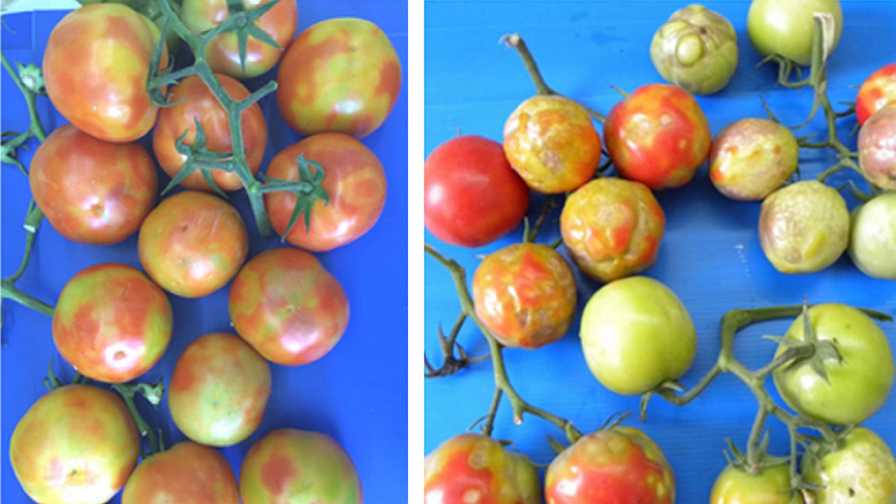Potential Development in Race Against Deadly Tomato Disease
While not yet spotted in Florida, tomato growers and plant health officials are worried about tomato brown rugose fruit virus (ToBRFV). It has spread fast around the globe since being first identified in 2014 in Israel. And it has been documented to have the potential to reduce yields by 30% to 70%.

Just some of the symptoms of the tomato brown rugose fruit virus.
Photos courtesy of Luria et al., 2017
The Florida Department of Agriculture and Consumer Services issued a pest alert for the disease in 2019. The alert noted Florida’s growing imports of foreign tomatoes made the state vulnerable for introduction of the pest. ToBRFV was confirmed in Mexico in 2019.
High Resistance
Netherlands-based Enza Zaden seed company announced the discovery of a gene that imparts high-resistance to ToBRFV. It characterized the find as “a major breakthrough.” The company’s researchers believe this gene is like no other currently known in the field.
Kees Konst, Enza Zaden’s Crop Research Director Tomato, explains when the team at Enza Zaden first heard about ToBRFV from its sales representatives in the Middle East in 2014, their knowledge of other tobamo viruses such as tomato mosaic virus (ToMV) and tobacco mosaic virus (TMV) gave an indication of what was to come.
“We analyzed it, and knowing it’s a tobamo, so it spreads mechanically, we realized it would travel all over the world,” he says.
De la Fuente van Bentem, a Plant Pathologist with Enza Zaden, notes the industry already had a solution to ToMV and TMV — a single resistance gene that has been used for decades to stop these two viruses.
“This new tobamo virus is not hindered by that resistance, so clearly the industry had to come up with a new solution,” he says.
Bentem explains Enza Zaden’s approach was to screen for new resistance genes in its wild tomato germplasm — a huge seed collection of wild tomato relatives that are crossable with normal cultivated tomatoes.
“It’s like looking for a needle in a haystack, but we have identified a gene providing high resistance against ToBRFV,” Bentem says.
With the discovery in hand, the company will now start developing tomato varieties with high resistance, which they report will be available in the coming years. Currently varieties in trials are showing no symptoms of the virus in the presence of high pressure.










